Apple iPad mini with Retina Display: Reviewed
by Anand Lal Shimpi on November 16, 2013 8:00 AM ESTThe SoC
The iPad mini with Retina Display rounds out the three platforms that use Apple’s A7 SoC. Although both the iPad Air and iPhone 5S use the A7, the mini’s implementation is closer in nature to the iPhone. The iPad mini’s SoC has always used the same package-on-package (PoP) assembly as the iPhone, with DRAM stacked on top of the SoC itself (1GB in this case). The benefit is obviously a reduction in board area, the downsides have to do with cost and thermals. That’s the first similarity between the mini’s A7 and the iPhone’s A7.
The second is one of frequencies. While the iPad Air’s A7 runs its two Cyclone CPU cores at up to 1.4GHz, the SoC in the iPad mini and the iPhone 5S runs at up to 1.3GHz. That might sound like a minor difference, but it’s far more pronounced when you look at what happens to frequency when you’re running heavy workloads.
Once again I turn to a fairly heavy CPU workload to plot performance over time. This is a multithreaded workload, slightly modified from what we used in the iPad Air review, designed to make the CPU cores consume max power. The scale is linear and the workload is the same across all devices, so what you’re effectively looking at is a graph of thermally bound CPU performance over time across all three A7 implementations:
Being the largest device (and the only device with a metal heat spreader and no DRAM stacked on top), the iPad Air obviously maintains the highest frequencies for the duration of the test. The iPhone 5S, with a significant reduction in internal volume (and a PoP SoC) reduces its CPU frequencies early on in order to keep skin temperature down and properly manage thermals. The iPad mini with Retina Display falls between the two, with its performance curve more closely following that of the iPhone 5S.
Although the mini has a similar max operating frequency to the iPhone 5S, it is a faster device thanks to it being less thermally constrained. Similarly, the iPad Air can be much faster than its clock speed would otherwise imply. If you’re wondering why Apple has been so focused on building its own SoCs and CPU architectures, this is the reason why. There’s a fixed amount of power you can dissipate in the form of heat in these mobile devices while still maintaining a good user experience. Performance per watt is the gating metric for success in mobile, and shipping high IPC/low frequency dual-core SoCs at 32/28nm is the best optimization available to a company like Apple today.
As you’d expect, our browser based CPU tests show the mini’s A7 performing in between the iPhone 5S and iPad Air. None of these tests are anywhere near as stressful as our thermal test from above, so we don’t see exaggerated differences in performance between the platforms. For most, I suspect you won’t notice a huge performance difference between the mini and Air. Those who are heavier users (e.g. audio mixing, 3D gaming, etc…), there will be a performance difference between the two iPads.
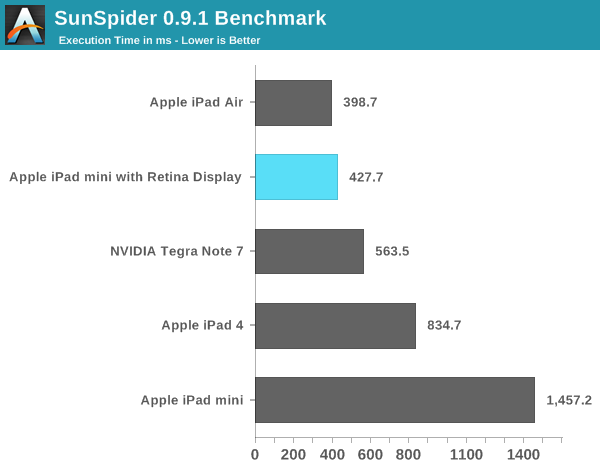
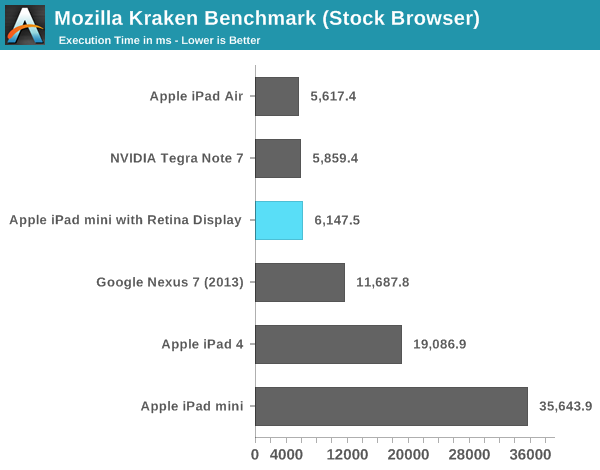
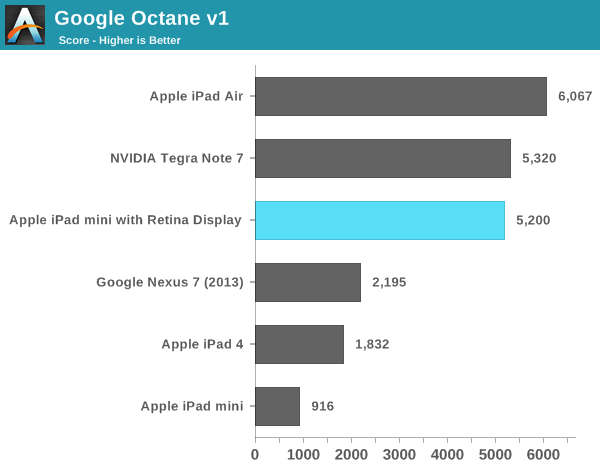
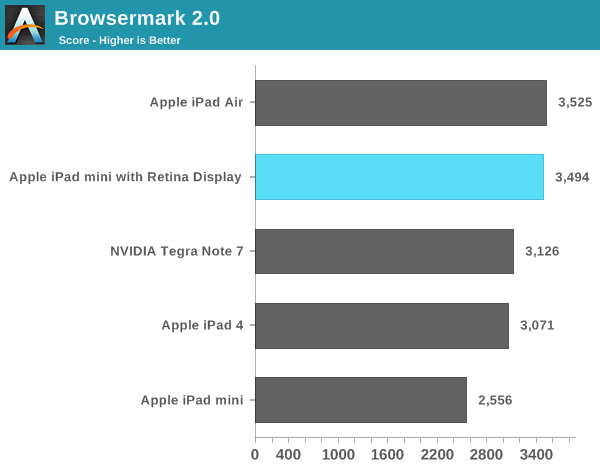
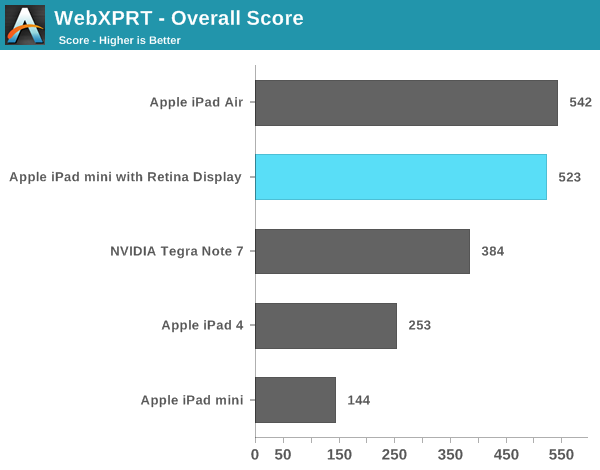
Compared to the first generation iPad mini, the new model is in a completely different performance league. Keep in mind the first mini used Apple’s A5 SoC based on an ARM Cortex A9. That’s the same single threaded performance as what’s in an iPhone 4S, and under iOS 7 it’s clearly running into some performance limits. The new mini with Retina Display however is a completely different animal. It’s fast.
Even comparing to the 4th generation iPad, the new mini is noticeably quicker.
Memory Bandwidth
Looking at the iPad mini’s memory bandwidth curve, we see it tracks very closely with that of the iPhone 5S. This is a slightly modified version of our previous bandwidth test, and you can see peak usable memory bandwidth (from the CPU’s perspective) of around 10GB/s. The ~12GB/s area right before you get out to main memory is bandwidth to the A7’s 4MB system-wide cache that sits after the shared L2 and the memory controller. This cache appears to service CPU, GPU and ISP requests at least.
GPU Performance
I believe the A7’s PowerVR G6430 GPU runs at around 450MHz. This frequency appears unchanged across all three A7 implementations. Once again, the big difference is how much thermal headroom exists in the platform which has an impact on overall performance.
Kishonti’s low level GPU performance tests back up my assertion that GPU frequency is fixed across all A7s. The iPad mini with Retina Display delivers equal performance to the iPad Air. The bigger news here is that nearly all of the GPU bound 3D tests seems to peg the mini and Air as equals. These are some pretty intense tests, but it looks like on the GPU side there’s no significant throttling when running at full tilt.
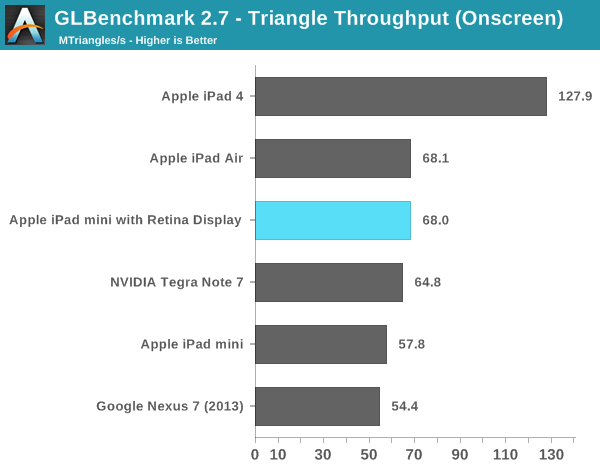
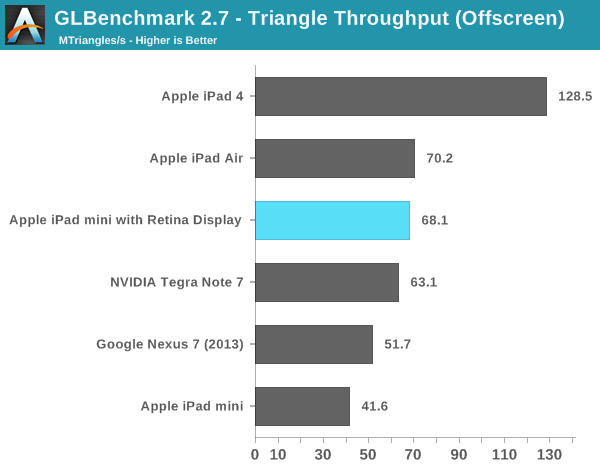
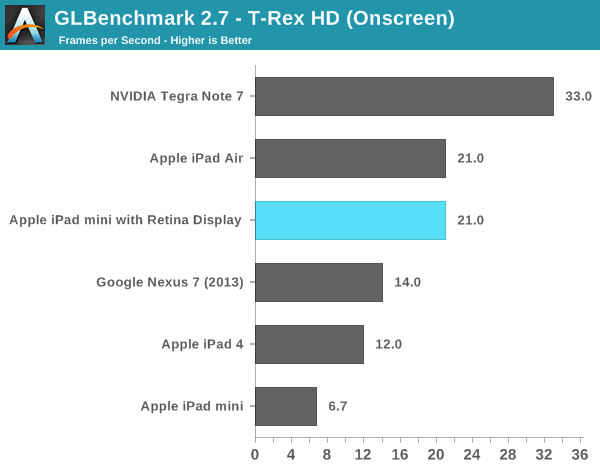
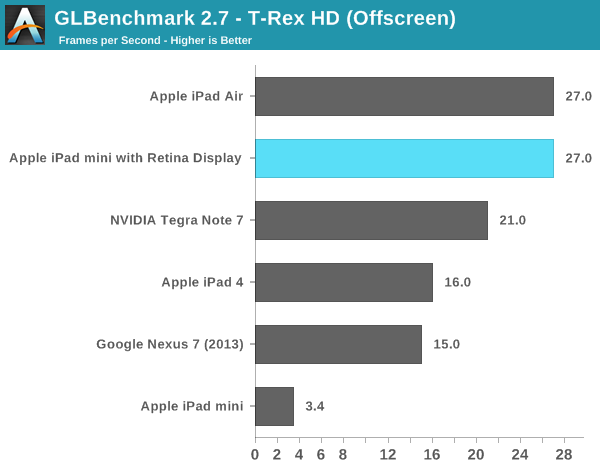
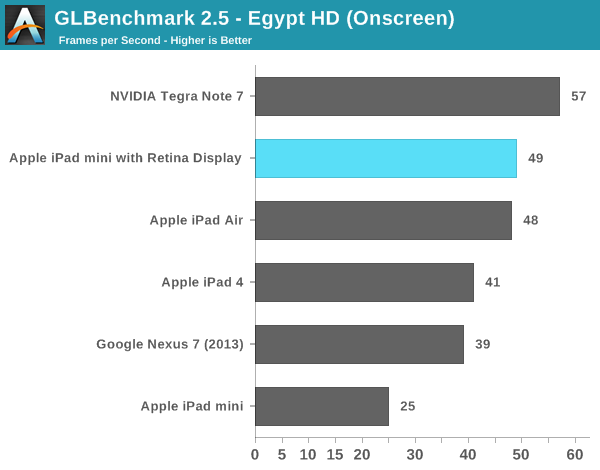
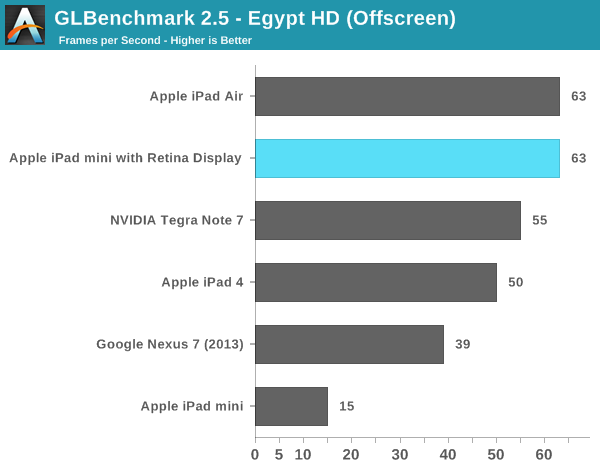
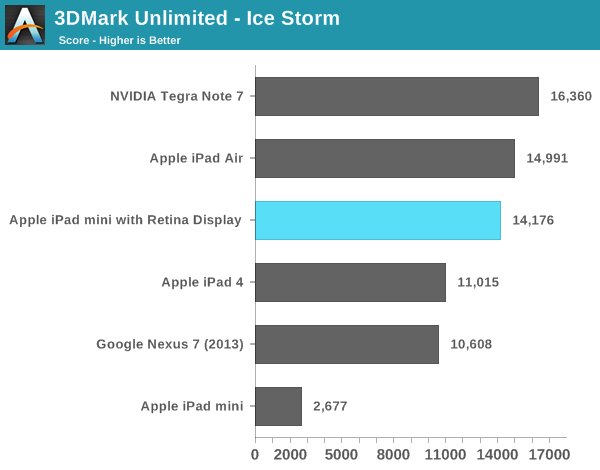
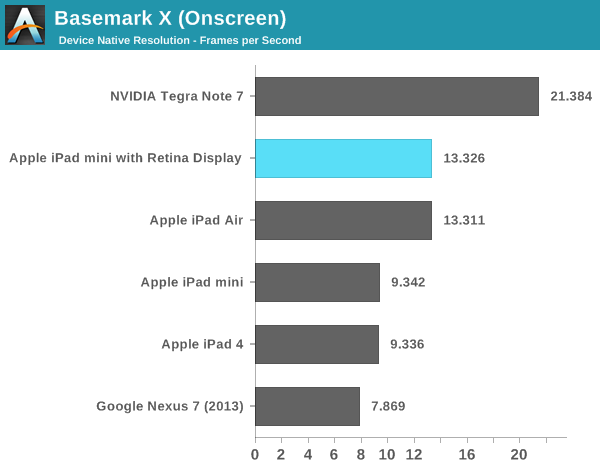
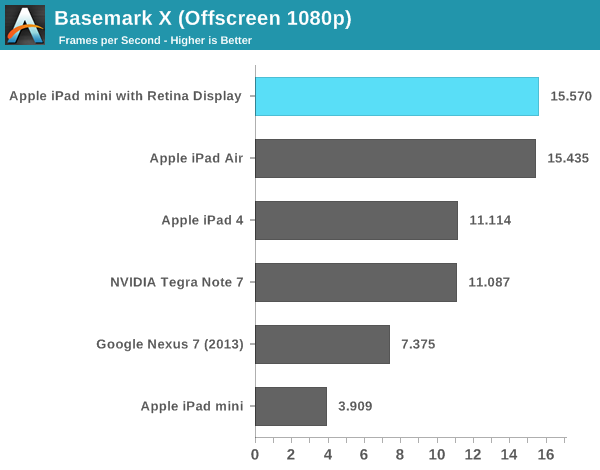
As I mentioned in our iPad Air review, despite having less peak theoretical memory bandwidth than the A5X/A6X, the A7 in the iPad mini never seems to regress in performance compared to even the iPad 4. Across the board the mini appears to be faster, more responsive and have more performance on tap than any prior iPad (big or small). The comparison to the original iPad mini is of course night and day. Even looking at lighter tests like the old GLBench Egypt HD benchmark, the iPad mini with Retina Display manages to be nearly twice as fast as the original mini - all while rendering 4x the number of pixels.


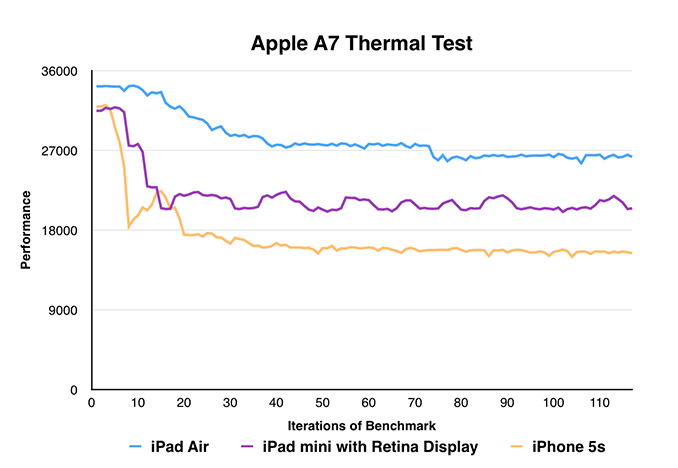
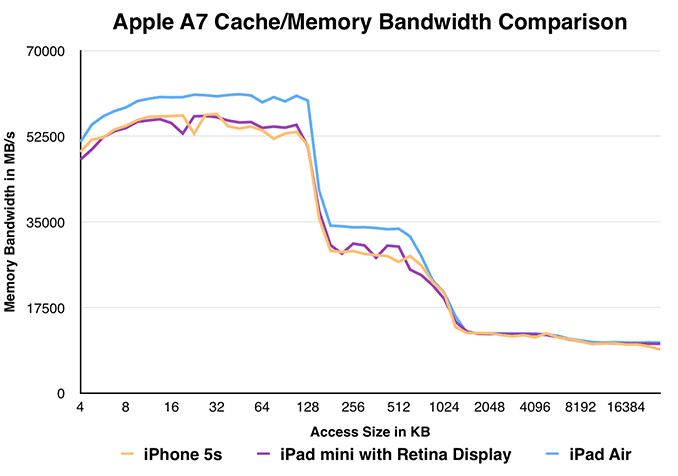








345 Comments
View All Comments
akdj - Sunday, November 17, 2013 - link
I frequent about a half dozen tech sites a say. A couple specific to iOS/Android. As well as Anand. I'm curious if it's YOU that's 'new to the internet'? No. Anand's Android reviews and comment sections are actually very friendly and without iOS interjection or conjecture based on 'mine's better than yours' bullshit. In fact, I find the same on the two Android forums I visit. AndroidCentral and XDA. Neither have routine iOS/iPhone/iPad users spreading their drivel....in fact. With almost 200 comments, have you noticed that you're one of maybe three or four people accusing Anand of bias? Arguing objective date? Actually taking the time out of your day to post about something you've got no passion or appreciation for? Might wanna get out of that basement. Feed your spider, move out of mom's place....and start breathing through your nose, too.
Puberticus - Saturday, November 16, 2013 - link
You put that very well. I agree.It's almost pathological -the way you see android and Windows users who would never in a million years go near an Apple device, immediately flock to an Apple review site. I've never known quite what to make of it.
Conversely, Apple fans apparently just don't give a damn. I guess they figure it's not their worth their time to criticize anything.
KoolAidMan1 - Sunday, November 17, 2013 - link
Fandroids are very vocal and very insecure. Saying that Apple has great hardware and iOS has great apps sets them off in ways that make console fanboys look sane.doubledeej - Saturday, November 16, 2013 - link
Never trust a review from someone who relies on getting hardware from the manufacturer. In order to keep new devices coming they have to write nothing but overwhelmingly positive reviews, especially if it is for an Apple product -- we've seen many times in the past where reviewers are cut off from future Apple products when they write less-than-stellar product reviews.If you want a fully honest review, you have to seek out those that buy the hardware outright. It's just a fact. Reviews of products provided by the manufacturer just can't be trusted, whether it is an Apple product or from someone else.
While I really like Anand, and I will be buying an iPad Mini with RD, this review (like that of the iPad Air) is missing any significant critiques of the device. Any proper review will have both the pros and cons. And a quick two sentence mention of a competitor's product doesn't count as a con. A proper review would say "this is why you should get the device" but would also contrast it with "here is why you shouldn't get the device." It's like what you'd do in a debate class... weigh both the positives and negatives. This, like many other Apple product reviews, is pretty much missing the latter entirely. If this was taken as 100% honest, there is no meaningful reason for anyone NOT to buy an iPad Mini with Retina Display. Not even those that can't afford it, or maybe have already invested into another ecosystem. You get the impression that this device is basically perfect for everyone. While it may be perfect for some portion of the population, it just isn't going to be perfect for everyone.
Here's to hoping that future reviews will be more objective...
iLovefloss - Saturday, November 16, 2013 - link
Yeah, look at the glowing review AnandTech has given the R9 290 and R9 290X. They totally glossed over any fault within those cards because AMD has been bankrolling AnandTech (they even have a dedicated AMD section on the site).Hey, maybe you should get over yourself. Anand has given his opinion of the device. That's what a review is. He even included some objective information. He doesn't gloss over any significant fault of the device. He likes it. If you don't like it, that's your opinion. But don't start whining because Anand didn't stop to wonder how random people on the Internet will feel about every feature of the device.
Do you people who always complain about objectivity or subjectivity in these reviews actually know what reviews, subjectivity, and objectivity are?
You can't have a tech review without a significant degree of subjectivity. These aren't scientific papers. The author of any review will have to insert his or her values and (subjective) judgements on the device they're reviewing. Instead of whining about this, how about looking towards a reviewer who shares your values?
iLovefloss - Saturday, November 16, 2013 - link
Seriously, how do you expect Anand to be any more objective than he already is? Discard his own opinions about the device completely? If he did that, then why bother reading the review. Just take a look at his pretty graphs.You, of course, probably mean neutrality when you say objectivity, right? You want him to be unbiased or appear so. Well, he is. Anand was pressed to review and no one forced/coerced his Final Words. He was just genuinely impressed with the device. He prefers iOS and Apple products. Given their performance and his own subjective feelings, he feels like the iPad Mini w/ Retina Display offers a good experience that is worth the money. He gives his reasons for his feeling, and he offers numbers and other objective measurements to back up/reinforce his general impression of the device. That's a review. You're complaining that he doesn't spend enough time complaining about a device he genuinely likes.
"If this was taken as 100% honest, there is no meaningful reason for anyone NOT to buy an iPad Mini with Retina Display. Not even those that can't afford it, or maybe have already invested into another ecosystem. You get the impression that this device is basically perfect for everyone."
I'm sorry if that what was you taken out of the review. It is easy to call you intellectually dishonest, but I feel you're really just clueless. Read Anand's Final Words. He implied that if you prefer Android to iOS then you should check out the Nexus 7. He implied with this implication (implication inception, mutha fuckas) that your feelings on Android and iOS comes down to personal preference.
If you took everything this review as 100% truth, you'd think that the iPad Mini with Retina Display is a good tablet for Anand. You'll also think that whether you like the Nexus 7 or iPad Mini with Retina Display better would be left up to whether you prefer Android or iOS.
Reading reviews isn't hard! You just need a fourth grade level of reading comprehension.
doubledeej - Monday, November 18, 2013 - link
You obviously didn't read my full comment. "...I will be buying an iPad Mini with RD."If you want to see what a real review looks like go take a look at the on on Ars Technica. They still praise the device, but they also include the cons as well. I'm not asking for a negative review, just an honest one.
ruggia - Saturday, November 16, 2013 - link
so you are telling me TheVerge got cut off from Apple because they were not praising their iDevices enough?solipsism - Saturday, November 16, 2013 - link
They gave the Retina iPad Mini a 9.3 out of 10. Sounds like high praise to me.ws3 - Saturday, November 16, 2013 - link
So the iPad Mini Retina gets good reviews on every site? Maybe that means it's a good product.